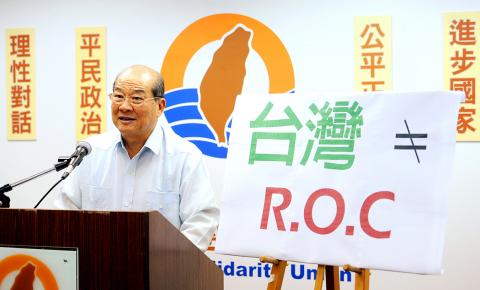Academics and politicians continued to express mixed reactions yesterday to Democratic Progressive Party (DPP) Chairperson Tsai Ing-wen’s (蔡英文) “recognition” of the Republic of China (ROC) last weekend, with some members of the pan-green camp voicing strong disapproval.
While most people, including the DPP’s rival in the January presidential elections the Chinese Nationalist Party (KMT), welcomed the statement, some DPP members expressed displeasure over Tsai’s statement, with DPP Legislator Twu Shiing-jer (涂醒哲) saying that Taiwan is not the ROC and that its status remains undecided.
Tsai, the DPP’s presidential candidate, repeated her call for members of the pan-green camp to support her willingness to recognize the ROC on Monday night in a campaign stop in Chiayi City.

Photo: Lo Pei-der, Taipei Times
Taiwanese were able to “absorb the ROC in” 60 years, she said, so that the KMT should be more closely identified with Taiwan by now.
She also said that Taiwan was more than a geographical term or a “homeland,” as President Ma Ying-jeou (馬英九) said in his national day speech on Monday, but a place with a “meaning of sovereignty.”
Media quoted analysts as saying that Tsai’s statement was “not surprising” and was in line with the DPP’s resolution on Taiwan’s future in 1999, which stated that Taiwan is an independent and sovereign country currently using the name ROC.
Tsai’s interpretation of the ROC differs from Ma’s, which still defines the ROC as the country -established by Sun Yat-sen (孫逸仙) in 1912 and which consists of 35 provinces, including modern-day Mongolia, former Mainland Affairs Council chairman Joseph Wu (吳釗燮) told a forum organized by the Taiwan Brain Trust.
The ROC that Tsai recognized is a country with the territories of Taiwan, Penghu, Kinmen and Matsu, a country that remade itself after being expelled from the UN in 1971, Wu said.
Most Taiwanese would be able to relate to Tsai’s interpretation of the ROC better than that of Ma’s, which holds the view that the ROC — and only the ROC — holds sovereignty and Taiwan is and has always been only part of the ROC, he said.
Meanwhile, the Taiwan Solidarity Union (TSU), a DPP ally, expressed its disagreement with Tsai, saying that “Taiwan is not the ROC and the ROC is not Taiwan.”
“Taiwan is Taiwan. It is a de facto independent country. The TSU always maintains that what Taiwan really needs is name rectification and a new constitution,” TSU Chairman Huang Kun-huei (黃昆輝) told reporters at a separate press conference.
Taiwan was not an ROC territory when the ROC was founded in 1912, nor did Taiwan send representatives to the ROC Constitutional meeting in 1936, which was why former president and TSU spiritual leader Lee Teng-hui (李登輝) characterized it as “the ROC in Taiwan,” Huang said.
Lee referred to the current situation as “the ROC in Taiwan” because dictator Chiang Kai-shek (蔣介石) and his KMT troops brought “the ROC system” to Taiwan after their defeat in the Chinese Civil War in 1949 without first securing the consent of Taiwanese, Huang said.

Auckland rang in 2026 with a downtown fireworks display launched from New Zealand’s tallest structure, Sky Tower, making it the first major city to greet the new year at a celebration dampened by rain, while crowds in Taipei braved the elements to watch Taipei 101’s display. South Pacific countries are the first to bid farewell to 2025. Clocks struck midnight in Auckland, with a population of 1.7 million, 18 hours before the famous ball was to drop in New York’s Times Square. The five-minute display involved 3,500 fireworks launched from the 240m Sky Tower. Smaller community events were canceled across New Zealand’s

The Ministry of Foreign Affairs (MOFA) yesterday said it is closely monitoring developments in Venezuela, and would continue to cooperate with democratic allies and work together for regional and global security, stability, and prosperity. The remarks came after the US on Saturday launched a series of airstrikes in Venezuela and kidnapped Venezuelan President Nicolas Maduro, who was later flown to New York along with his wife. The pair face US charges related to drug trafficking and alleged cooperation with gangs designated as terrorist organizations. Maduro has denied the allegations. The ministry said that it is closely monitoring the political and economic situation

‘SLICING METHOD’: In the event of a blockade, the China Coast Guard would intercept Taiwanese ships while its navy would seek to deter foreign intervention China’s military drills around Taiwan this week signaled potential strategies to cut the nation off from energy supplies and foreign military assistance, a US think tank report said. The Chinese People’s Liberation Army (PLA) conducted what it called “Justice Mission 2025” exercises from Monday to Tuesday in five maritime zones and airspace around Taiwan, calling them a warning to “Taiwanese independence” forces. In a report released on Wednesday, the Institute for the Study of War said the exercises effectively simulated blocking shipping routes to major port cities, including Kaohsiung, Keelung and Hualien. Taiwan would be highly vulnerable under such a blockade, because it

UNRELENTING: China attempted cyberattacks on Taiwan’s critical infrastructure 2.63 million times per day last year, up from 1.23 million in 2023, the NSB said China’s cyberarmy has long engaged in cyberattacks against Taiwan’s critical infrastructure, employing diverse and evolving tactics, the National Security Bureau (NSB) said yesterday, adding that cyberattacks on critical energy infrastructure last year increased 10-fold compared with the previous year. The NSB yesterday released a report titled Analysis on China’s Cyber Threats to Taiwan’s Critical Infrastructure in 2025, outlining the number of cyberattacks, major tactics and hacker groups. Taiwan’s national intelligence community identified a large number of cybersecurity incidents last year, the bureau said in a statement. China’s cyberarmy last year launched an average of 2.63 million intrusion attempts per day targeting Taiwan’s critical